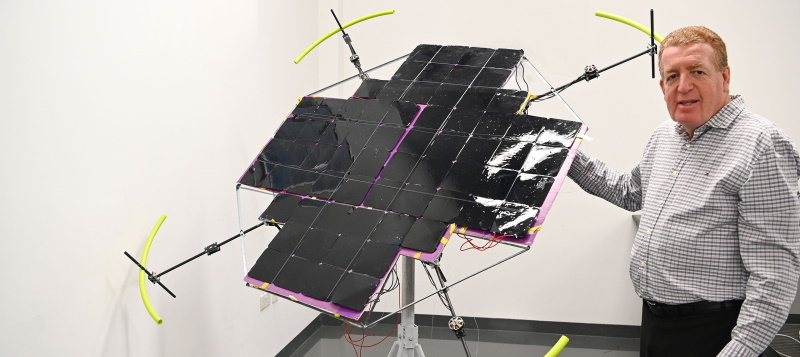
AUS researcher and Petrofac Chair develops novel robotics and autonomous system models using AI and ML in international collaboration
Having established research collaborations with George Washington University (GWU) in Summer 2022, Dr. Rached Dhaouadi, Professor in Electrical Engineering and Petrofac Research Chair in Renewable Energy at American University of Sharjah (AUS), is currently working on two novel research projects in control systems utilizing artificial intelligence (AI) and machine learning (ML).
The first project explores the modeling and control of large solar-powered quadcopters to monitor solar farms, which are considered to have the greatest sustainable potential and widest applicability worldwide.
The second project focuses on developing an adaptive control scheme for a robotic arm with flexible joints using ML. Known for their many applications in diverse industries, robotic arms are widely used in automobile assembly lines, assisted surgery, industrial applications such as welding, painting and drilling, and many other areas. The new artificial neural network-based techniques aim to make the movement of the robotic arm smoother and more accurate, reducing vibrations. Dr. Dhaouadi initiated the second project on robotic arm control systems following his visit to GWU this summer.
.jpg)
The two projects are in collaboration with Dr. Amir Jafari, Assistant Professor at GWU, and Dr. Reza Jafari, Associate Professor and Director of the Program of Electrical Engineering at the East Coast Polytechnic University in Northern Virginia and Adjunct Faculty at GWU.
“For the past five years, I have been investigating the use of large quadrotors, also known as quadcopters or drones. They are known for their high maneuverability, speed and wide range of applications compared to land-based devices. Quadcopters have been used as unmanned aerial vehicles for reconnaissance and surveillance by military agencies as well as in industrial applications. As a result, there is a strong interest in developing new control tools to further enhance their performance and durability,” said Dr. Dhaouadi.
He added: “Large quadrotors can be flexible, which may lead the airframe to bend and cause control system challenges. For this reason, the project aims to develop an intelligent control system and test it first via virtual simulation, then through experiments on a testbench. The proposed solution will allow longer flights and fewer stopovers at recharging stations and can be useful for many applications, including search and rescue missions, exploration within hazardous areas or surveillance within isolated environments that are difficult to physically reach. One additional potential application that is becoming a major topic of interest is the inspection of large solar farms.”
Conducted under the umbrella of the Petrofac Research Chair in Renewable Energy at AUS, the two projects are part of the research portfolio of the Renewable Energy Research Center (RERC) in AUS’ College of Engineering, which is currently working on several projects focused on renewable energy. The center was made possible through the AUS Petrofac Chair Endowment and it involves faculty members, research assistants, undergraduate students and graduate students.
“The generous support of Petrofac through the Research Chair in Renewable Energy makes it possible to work on many of these projects. AI and ML are highly interdisciplinary and applicable to many fields including computer science, information science, engineering, statistics, mathematics and cognitive science. Considerations of practice, often derived from the social, behavioral and economic sciences, can inform new directions for computational science to better realize the benefits of data analysis. These two research projects put theory into practice as they attempt to overcome the challenges and requirements of complex structures such as robotics and autonomous systems,” said Dr. Dhaouadi.



























